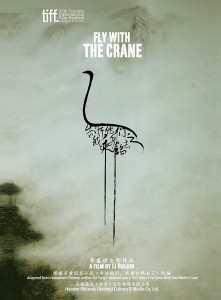Fly with the Crane
告诉他们,我乘白鹤去了
China, 2012, colour, 16:9, 100 mins. (premiere/international version), 108 mins. (Mainland version).
Director: Li Ruijun 李睿珺.
Rating: 6/10.
A warmer but still over-extended country fable from the director of The Old Donkey.
Huaqiangzi village, Luocheng township, Gansu province, northwest China, the present day, summer. Ma (Ma Xingchun), 73, was once a celebrated coffin-maker and painter but now mostly hangs around chatting with old friends and playing with the village children, including his grandson Zhi (Tang Long), especially as the government has made cremation mandatory. His former colleague, Cao (Wang Dazhi), asks him to make a coffin for him, and Ma works on it, painting a white crane on the side as a sign of an auspicious send-off. As the Mid-Autumn Festival approaches, Ma’s daughter Cunhua (Zhang Min) invites him over to her house to celebrate it. While there, Ma hears from her young daughter Miaomiao (Wang Siyi) that there are graves still used near the village; he says he’d like to live there, rather than with his son (Wu Renlin), so he can be buried when he dies. After returning to live with his son, Ma hears from his friend Tang that Cao has died and has secretly been buried in the cornfields around Caozi Lake. Ma claims he saw white cranes there, but the children say they were actually herons. So determined is Ma to be buried in traditional style that Zhi and Miaomiao aid him in a secret plan.
REVIEW
Fairly similar in its indie artiness to The Old Donkey 老驴头 (2010), the previous film by writer-director Li Ruijun 李睿珺, and again using the two lead actors of that film as well as Li’s own family and friends, Fly with the Crane 告诉他们,我乘白鹤去了 is emotionally more accessible but still feels like a short expanded to feature length. Based on a 2006 short story by well-known writer Su Tong 苏童 – four of whose works have previously been filmed, most notably by Zhang Yimou 张艺谋 (Raise the Red Lantern 大红灯笼高高挂, 1991) – the film transfers the setting to Li’s native province of Gansu, in northwest China, with the dialogue again bathed in thick local dialect.
More importantly, the movie benefits from warmer roles assigned this time to Ma Xingchun 马兴春, as a crafty old coffin-maker who wants to be buried according to local custom, not cremated as per the government’s new ruling, and to Zhang Min 张敏, as his naggy but loving daughter. The film also gains an attractive lightness by having two kids, naturally but likeably played by Tang Long 汤龙 and Wang Siyi 王思怡, in the story’s foreground. It’s in their scenes that the film best captures some of the flavour of Su’s story, which is more concentrated on the (mythical?) white crane of the title – seen as a good augury for going to heaven – than Li’s adaptation, which is much more a portrait of a village and the quiet stubbornness of its inhabitants. In Donkey, the same approach centred on a battle between commerce and tradition; here it’s between traditional and modern beliefs.
The HD photography, again by Yang Jin 杨瑾, is less focused on landscape and long and medium shots, and has more saturated colours (especially vivid reds) which also contribute to the warmer tone. The percussive, droney music by Xiaohe 小河 adds an offbeat flavour that’s not entirely suitable, drawing too much attention to itself rather than underscoring the quiet humour and irony. The original title means “Tell Them I Took the White Crane”.
[Version reviewed is the shorter, international one. A 117-minute Director’s Cut also exists.]
CREDITS
Presented by Heaven Pictures (Beijing) Culture & Media (CN). Executive producer: Gao Hong. Producers: Yang Cheng, Li Ruijun, Shen Xiaoping.
Script: Li Ruijun. Short story: Su Tong. Photography: Yang Jin. Editing: Li Ruijun. Music: Xiaohe. Art direction: Li Ruijun. Costumes: Zhang Min. Sound: Wang Changrui.
Cast: Ma Xinchun (Ma), Tang Long (Zhi, his grandson), Wang Siyi (Miaomiao, his granddaughter), Zhang Min (Ma Cunhua, Ma’s daughter/Miaomiao’s mother), Wu Renlin (Ma’s son/Zhi’s father), Wang Cailan (his wife), Wang Zhihang (Jun, kid), Wang Dazhi (Cao), Li Shengjun (Cao’s son), Cao Hongmei (Cao’s wife), Tang Jide (Tang), Wu Gaozhi (Wu), Li Shengfu (village head), Shu Jizong (Zhi’s third uncle).
Premiere: Venice Film Festival (Horizons), 5 Sep 2012.
Release: China, 8 Jun 2013.
(Review originally published on Film Business Asia, 13 Sep 2012.)
